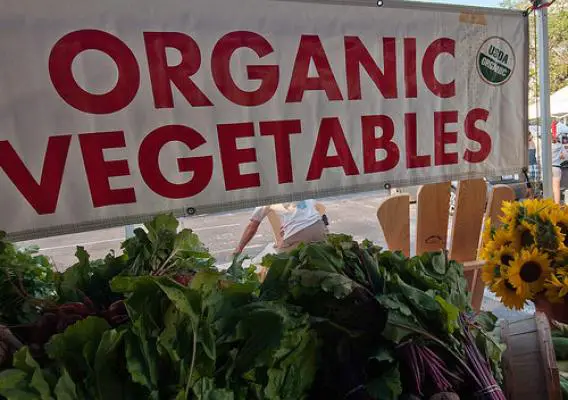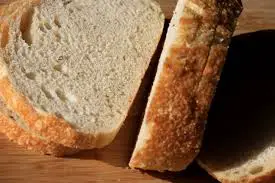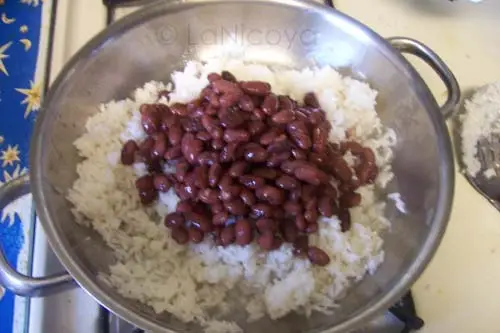
Photo via USDA
If you polled 100 people off the street with no prior warning about whether they prefer to eat organic food or food laced with synthetic pesticides like Monsanto and Bayer’s Roundup, odds are that the results would be decisive: a huge majority of them would choose organic food.
But the biggest reason why people don’t has nothing to with quality or taste: most of them simply don’t know how to eat organic food on a budget, or think it’s impossible to do.
When I first began eating organic, I started small with a budget of just $20 for about two weeks of purchases, and from there it become a lifelong passion bordering on obsession, considering the amount of money I now spend on organic food each month.
Over the course of my journey, I wrote a best-selling 162 page book for Amazon Kindle on how to save money on organic food, and one thing I’ve realized is that learning how best to save money on organic is a lifelong process in constant need of refinement.
After all, we’re paying a considerable premium for every food purchase just to avoid toxic chemicals, preservatives and GMOs in our food, whether we like it or not. On average, organic foods cost a shocking 47 percent more according to Consumer Reports, although some items cost the same or less than their conventional counterparts, including honey, maple syrup, and the fifth item on this list, organic lettuce.
When it comes to constructing a healthy and satisfying organic diet on a budget, the key is not to simply buy the cheapest foods, however.
I’ve found that identifying and investing in the right foundational foods for your own body type is even more valuable. The following is my list of favorite organic budget foods, distilled from years of experimenting with a wide variety of organic diets and approaches.
Top Five Foods for Eating Organic on a Budget
Nourishing. Satisfying. Low-inflammatory. Worth their weight in nutritional gold.
These are all phrases that describe the following five foods, which are my own personal go-to items in times of financial stress:
1. Sourdough Bread- Unlike most overly processed store breads packed with preservatives, additives, and dough conditioners similar to the infamous “yoga mat chemical” once used by Subway, sourdough bread is so low in inflammatory compounds that you may as well just classify it as gluten-free (except it’s much more satisfying than any of those breads).
I get mine from a local bakery slash eatery that uses an organic fermentation culture to make their bread for about $3-4.00. It lasts me a good week or longer depending on whether I decide to freeze it.

Sourdough bread is one of the healthiest budget organic foods on the market. Photo via Pixnio
When you’re in a pinch financially and you need to keep a budget for your organic food expenditures, it’s important to have foods on hand that you can grab and eat in minutes, and sourdough bread certainly fits the bill. Nutritional benefits include fiber, high mineral content (especially iron), probiotics, and much more, along with 8 grams of protein per slice.
Just be aware that it’s a little high in sodium at 13% DV for each slice, but that may actually be a good thing when you’re financially stressed, as long as you don’t overdo it.
2. Bone Broth – As far as organic food values go, it’s hard to beat bone broth. A heart bone broth stew has benefits for gut health, is high in protein, extremely low in inflammatory compounds. The beef variety is the highest in minerals, and is often surprisingly cheap when bought at a butcher or deli.
I first learned about the health benefits of bone broth in the one-of-a-kind natural health book ‘Cure Tooth Decay,’ in which a author Ramiel Nagel presents a Dr. Weston A. Price style diet that helps reverse tooth decay by only allowing for high mineral, low inflammation foods like bone broth, wild caught fish, raw dairy, cooked vegetables, and a few select tooth decay reversing supplements like high-vitamin butter oil and fermented cod liver oil.
To make a simple bone broth soup, add the following to a crock pot:
-A tablespoon of organic coconut oil
-A few tablespoons of apple cider vinegar to taste (helps pull out more minerals from the bones)
-Any vegetables you have lying around, especially garlic or onions
Instructions:
-Heat about an hour on high before adding the bones and letting them simmer overnight, then eat or save in the fridge
You’ll end up with a hearty, comforting broth that you can re-simmer an additional 1-2 times to make sure you get maximum nutrition out of each bone (minerals, protein and more).
As long as they are from organic or grass-fed animals, you can’t go wrong with bone broth for eating organic on a budget (as a vegan alternative, try making complex vegetable broths using every part of the vegetable like carrot greens or broccoli stalks).

The Costa Rican dish gallo pinto is amazing for eating organic on a budget. Click here to see a recipe (Photo via Amy on Flickr)
3. Beans (and Rice) – In the Nicoya Peninsula of Costa Rica where people routinely live well past the age of 100, beans and rice are staple foods that are simmered, cooked, consumed, and even sold throughout the day.
In this case, slow-cooked red beans with traditional white rice are made into a dish called “gallo pinto,” which is one of the simplest and most satisfying meals I’ve ever eaten, especially with the signature green sauce Salsa Lizano.
In Costa Rica, the dish often comes with a plantain on the side, and an extra protein such as an egg or fresh caught fish.
But generally speaking, this red beans and rice combo is more than enough to create a healthy and satisfying meal, especially if you’ve got the right sauces and spices on hand.
4. Eggs- These are one of the most controversial foods for eating organic on a budget, but they’re the perfect combination of satisfying, robust, and relatively cheap to stay satiated on a tight budget.
Eggs are also versatile and packed with nutrition. While they may be high in cholesterol, the body actually needs cholesterol to create new hormones (including the all-important Vitamin D), cells, and other important building blocks.
To get them at a budget price, find a local egg producer at a farmer’s market near you, and consider sharing your situation and asking if they can cut you a deal on buying them in bulk. Most organic farmers are very receptive.
5. Apples and Romaine Lettuce (tie)- Eating organic on a budget is not just about filling your stomach, it’s also about having the right ratio of foods to stay satisfied and feed your cells.
In terms of healthy organic foods to eat on a budget, it’s hard to top apples and romaine lettuce, which are excellent at both cleansing and building the body.
Apples contain pectin, which will help to remove any environmental or food toxins in your system. They’re delicious, relatively filling, and while a little on the pricier side as far as organic foods go, worth their weight in nutritional gold.
Speaking of health benefits, a head of iceberg or preferably romaine lettuce is another excellent choice.
Both of them are high-water foods which will help trim your waistline while providing an underrated stock of natural vitamins and minerals.
Romaine lettuce is generally superior to iceberg and includes potassium (great for heart health), vitamin B1, fiber, magnesium (crucial in times of stress), vitamin B2 and B6, and even the rare Omega-3 fatty acids.
This type of lettuce is so powerful nutritionally that people on the 80/10/10 diet (which includes 80 percent fruit and 10 percent vegetables) eat a whole head of it as a meal for its high mineral content to help fortify a fruit-based diet.
Use these two raw plant-based foods to balance out your low-cost organic diet, and your nutritional needs can be mostly met for a relatively low cost.
Final Thoughts on the Top Organic Budget Foods
Eating organic on a tight budget can be difficult, but eating more of these nutritionally dense, low-inflammation (except for the beans), and satisfying organic foods is a great place to start.
As a general rule, avoiding processed foods is the biggest piece to this puzzle.
If you can’t live without your favorite organic chips, chocolate, or other guilty pleasures, however, consider stocking up when they’re on sale and keeping them in a closet somewhere you can’t easily get to them.
These strategies might not work for everybody, but they’ve certainly worked for me. Happy organic eating, and be sure to let us know your favorite tips in the comments section below!
Nick Meyer is the founder of AltHealthWorks.com and a longtime journalist who has authored several holistic health books on Amazon Kindle, including the best-seller Dirt Cheap Organic. To view a full list of his health books (each one has a 4-star rating or better), visit his Amazon page here.
Thanks for installing the Bottom of every post plugin by Corey Salzano. Contact me if you need custom WordPress plugins or website design.




